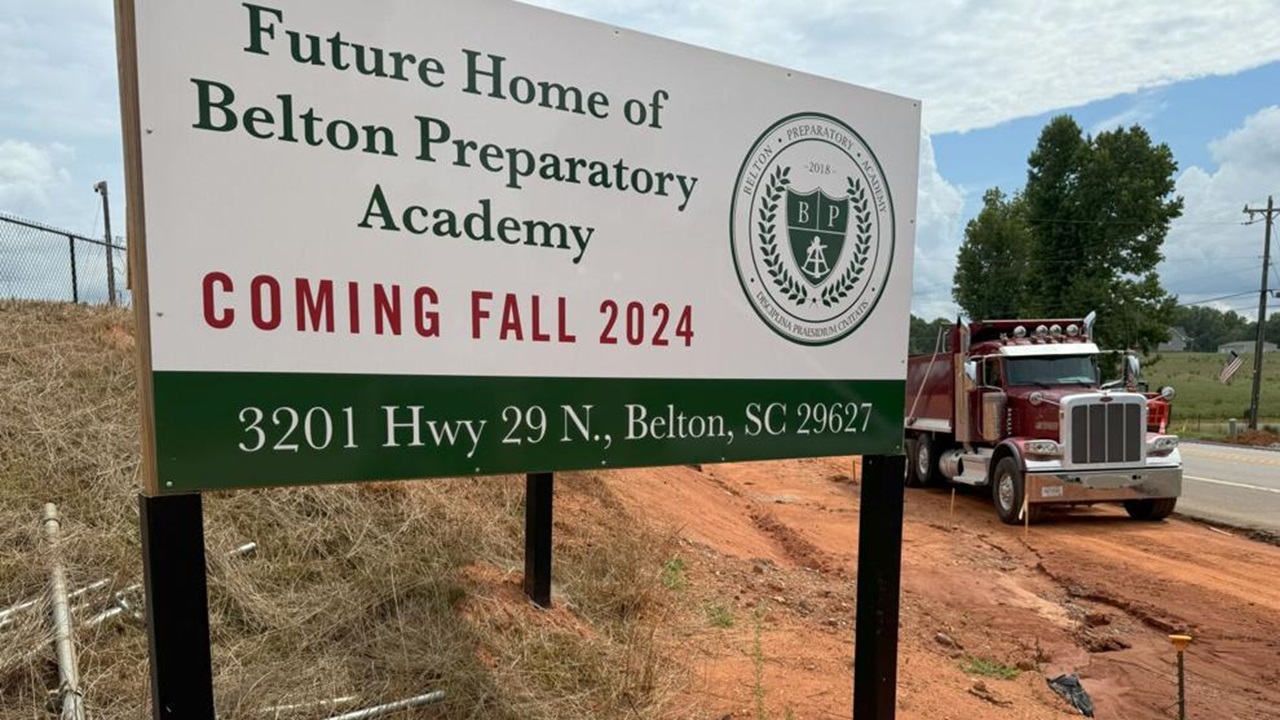Erskine Is in the News Again!

The article below appeared in The Post and Courier on July 30, 2024. For those who live in the Upstate or who live in other states and are unfamiliar with South Carolina newspapers, The Post and Courier is the Charleston newspaper, and one of the most important newspapers in South Carolina.
It’s been a long time since news about Erskine College has been reported on by both The State in Columbia and The Post and Courier. Erskine has made the big show!
Unfortunately, for Erskine and the ARPChurch (which governs Erskine by appointing the members of the Erskine board), the news is BAD! Both the college and denomination look pathetic and inept.
Erskine, the college of the Associate Reformed Presbyterian Church is identified as “a criminal enterprise” and accused “of public corruption, blackmail, criminal coercion, breach of contract and defamation.”
At the end of the article, I will make a couple of comments.
Editorial: After latest lawsuit, it's time to start over on SC charter school law
Things are getting pretty heated in the legal battle between Erskine College’s Charter Institute and a for-profit company that runs some of the charter schools that the institute allowed to operate with our tax dollars.
The Charter Institute sued the for-profit Icelaven Development Group this spring, claiming Icelaven’s charter management company Reason & Republic owed Erskine $1.2 million. Erskine had provided that money to Icelaven, possibly for a stake in Reason & Republic, which makes its money selling non-academic services to charter schools. You might want to read that again before we move on.
This month, The Post and Courier’s Anna B. Mitchell reports, Icelaven filed a counterclaim, accusing the Charter Institute of plotting to put Reason & Republic out of business so the college’s own charter management company — Teach Right USA — could take over its business running back-shop operations for schools that the Charter Institute is supposed to oversee. Yeah; that’s a lot to digest, too.
The lawsuit calls Erskine’s institute a criminal enterprise and accuses it of public corruption, blackmail, criminal coercion, breach of contract and defamation.
Potentially hotter is this question: Why would anyone think it was acceptable for Erskine to pay or loan $1 million to a business that was profiting from the schools Erskine is supposed to regulate? Also hot is all the rest of the tail wagging the dog that seems to be going on in South Carolina's charter school space.
When we piece together the lawsuits and previous reporting by The Post and Courier, it appears that charter management companies have been behind creating a lot of South Carolina’s charter schools and also involved in creating the two private charter authorizers that have offered safe haven for failing charters to escape authorizers that were about to close them. (Limestone University’s Charter Association is the other one.)
We have no idea which if any of the claims and counterclaims in the lawsuits have merit, or even a grain of truth.
What we do know is that what’s happening in this and other legal disputes is nowhere near what our legislators envisioned when they passed the 1996 law allowing organizations to create charter schools that would be funded by tax dollars and would operate free of most public school regulations.
When that law was written, charter schools were created by parents, often in conjunction with teachers, who wanted different options for their kids. The Legislature wanted experimentation that could lead to new approaches for improving regular public schools. What we’ve gotten is for-profit sponsors and hucksters creating schools whether there’s any local interest or not, and private colleges deciding which of these schools will receive our tax dollars.
Here’s the other thing we know: When charter schools first moved from niche to national movement, they produced largely unimpressive results. Stanford University's Center for Research on Educational Outcomes published a much- cited report documenting the mediocrity. A year ago, it issued a new report that found charter schools are providing dramatically better education than traditional public schools — in all but three states.
South Carolina was one of those three states.
Most kids in S.C. charter schools are falling behind their peers in traditional schools, while those in other states are leaping ahead, according to the university’s impressive data. There appear to be two primary reasons: We’ve allowed too many charter schools that operate entirely online — which as we learned during COVID is a recipe for disaster. And — thanks in large part to a charter-shopping provision in state law that allows any college to declare itself a charter authorizer and rescue failing schools from being closed — we’ve refused to hold charter schools accountable for delivering results.
We’ve been saying for years that the Legislature needs to pass a law that prevents additional colleges from declaring themselves charter authorizers — and likely even eliminate one or both of the ones we have. It simply defies logic that a private college would be allowed to decide who will and won’t receive tens of millions of taxpayer dollars, under what circumstances and for how long.
The more these charter authorizers and charter management companies and their pawn schools do battle, the clearer it becomes that just changing who can be an authorizer isn’t enough. We need to start over and write a whole new charter school law — one that recognizes the very different nature of charter schools today.
If the Legislature even allows private colleges to decide how S.C. tax dollars are spent, it certainly needs to bar them from selling services to the schools, or starting or owning charter schools, or loaning money to businesses that make money off the charter schools. That’s all just basic good sense.
Maybe legislators will decide that yes, they want to allow charter schools to be created by profit-seeking management companies that go out and recruit people to put their name on a charter. Or maybe they’ll decide we ought to stick to the idea that charters should be created locally, like we all thought would happen when they allowed them to come into South Carolina.
Whichever way they go, they should add a mechanism to enforce the idea behind the current law that charters are supposed to be laboratories of innovation, not just cookie-cutter stores of marginally adequate education.
Many S.C. charter schools are doing an excellent job. More should be. More that aren’t should be closed so they won’t keep stealing money that otherwise might go to good charter schools and regular public schools, as our law claims to require. That’s unlikely to happen until we get a clean start.
A Few Comments
1. The latest Erskine debacle involving charter schools is another lamebrain “get-rich-quick” scheme in a long line of such schemes. Indeed, lamebrain ideas at Erskine are epidemic to the soil in Due West. Let us not forget about football. Forget about Jesus! The savior of Erskine was going to be football (and a myriad of other athletic programs)! Alas! the football god responded to the supplications of the Erskine faithful with an 0 and 11 season last fall. Just before I was elected to the Erskine board in 1998, the 1990s saw a board chairman introduce a pyramid scheme to the Erskine board. Thankfully, Charles Carlisle was able to get the board chairman to guarantee personally a very large investment. When the scheme went belly-up, the board chairman paid up; however the boondoggle nearly ruined the board chairman.
2. Personally, it is satisfying to see Erskine publicly identified as a “criminal enterprise.” For years, I have warned ARPs there was something wrong with the way Erskine was managed. My experience on the Erskine board was unsettling. I witnessed financial practices which I thought were shady. When I asked questions of people I thought to be friends and honest, I was told, “This is the way we have always done it!” I was told not to be concerned about the lies I was hearing.. In hindsight, what I witnessed was a culture of lies at work. It was also a culture of intimidation. Woe to anyone who spoke out! No one dared to say anything negative about Erskine. Well, a great deal is being said now by a press which can’t be intimidated or dismissed as a quirky misanthrope.
3. The parade of the culture of lies is best seen at a meeting of General Synod. Year-after-year, Erskine Presidents and Board Chairmen came with glowing reports and speeches as to the wonderful things God is doing at Erskine. According to these paragons of integrity, Erskine is a shining example of a Christian college where young people are taught the truths of the Bible and those who are not Christians are being won to Christ. And, like a light on a high hill, the seminary has stood as a champion of Reformed evangelicalism in the face of a liberal theological onslaught against the Bible as the inerrant Word of God. Amazingly, the ARPs at the meetings of their General Synod were too ignorant or too stupid or too compromised or too lazy to see through the blanket of lies that was thrown over their heads. Well, light is now beginning to break over Due West, and the light is revealing a corrupt culture.
 4. Lately, one of the dumbest things to happen at the seminary is the hiring of Kyle Sims as representative to the churches in and out of the denomination. Sims, a failure as a pastor, is no better as a seminary representative. Living in Seneca, South Carolina, I am only an hour’s drive from Due West. As I hear it, the mystery in Due West is the following question: “What does Kyle Sims do?” Well, according to his Facebook account, HE EATS! Yes! that’s right! HE EATS! He calls himself “ The Hungry Preacher.” So, as he represents Erskine, He eats. At nearly seven feet tall and as large as Mount Rushmore, he is getting himself in shape. ROUNDER! I suppose he’s getting himself ready for his next stop. The scuttlebutt is Sims is doing everything he can to get a call. He once said to me, “Erskine Seminary needs to be closed!” Has he come to this realization again?
4. Lately, one of the dumbest things to happen at the seminary is the hiring of Kyle Sims as representative to the churches in and out of the denomination. Sims, a failure as a pastor, is no better as a seminary representative. Living in Seneca, South Carolina, I am only an hour’s drive from Due West. As I hear it, the mystery in Due West is the following question: “What does Kyle Sims do?” Well, according to his Facebook account, HE EATS! Yes! that’s right! HE EATS! He calls himself “ The Hungry Preacher.” So, as he represents Erskine, He eats. At nearly seven feet tall and as large as Mount Rushmore, he is getting himself in shape. ROUNDER! I suppose he’s getting himself ready for his next stop. The scuttlebutt is Sims is doing everything he can to get a call. He once said to me, “Erskine Seminary needs to be closed!” Has he come to this realization again?
5. Often I have been admonished to pray for God’s blessing on Erskine. At Synod meetings, I have heard prayer after prayer for Erskine. Nothing much has happened. Why are the heavens closed to such prayers? Could it be that they are asking God to bless what God says He will not bless, and, in so doing, the prayers are actually curses? Something to think about!
As reported and with a few comments, I am
![]()
Charles W. Wilson

I love getting directly to the point, truth and calling it what it is!!